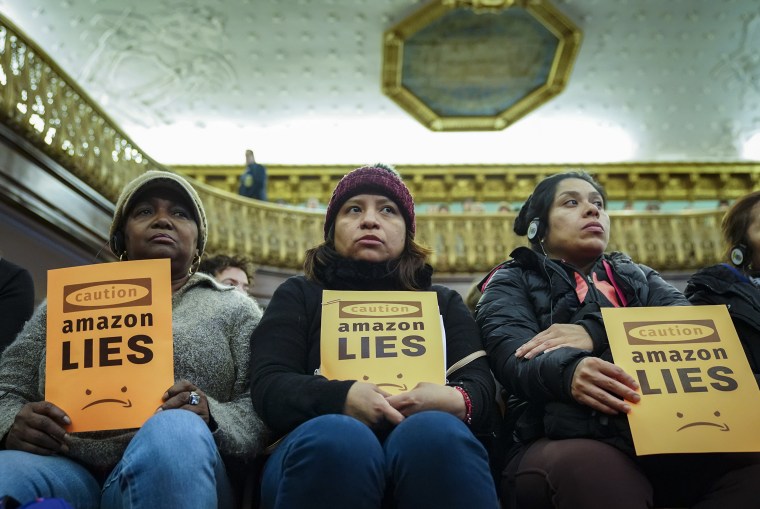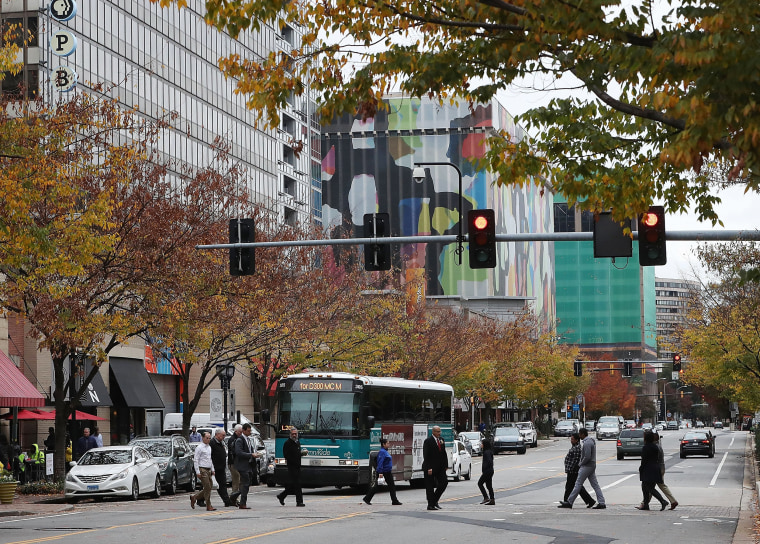Buoyed by the success of activists and policymakers in New York, a coalition of community and advocacy groups alongside a handful of local politicians in Northern Virginia are calling on policymakers to reject Amazon’s plans to build a second headquarters in Arlington.
The “For Us, Not Amazon” coalition is calling for transparency from Amazon and politicians over their plans for the East Coast headquarters, which were largely negotiated behind closed doors. They argue, as New York opponents did, that the project will lead to gentrification and rising housing costs that will disproportionately harm low-income and minority communities in the region.
As in New York, community activists in Virginia are concerned about the generous government incentives offered to the technology company. Under the terms of the deal, Amazon will receive $573 million in incentives in return for creating 25,000 jobs with an average wage of over $150,000.

The incentives are contingent on Amazon hiring for those roles over the next 12 years, and the company has claimed that its overall tax payments over the next 20 years in Virginia will reach an estimated $3.2 billion. Amazon said that New York’s tax credits would have amounted to $48,000 per job versus Virginia’s cash grants of $22,000 per job.
“How can money be given to one of the wealthiest companies in the world when we have real social needs that should be prioritized,” said Danny Cendejas, an organizer at La ColectiVA, a collaborative that advocates for social justice and equity on behalf of Virginia’s Latino community.
“Virginia has so many kids learning out of trailers,” he said, referring to underfunding and overcrowding in the state’s public schools. “The state package offered to Amazon could have been used to improve the education system.”
Roshan Abraham from Our Revolution Arlington, a community group that has challenged the HQ2 development since Amazon announced its shortlist of 20 possible sites in January 2018, said, “There has been no outreach to the low-income, working class, and black and brown communities of Arlington who will be most negatively impacted by Amazon’s arrival.”
“A lot of people are really concerned about rising housing costs, Amazon’s anti-union stance and workplace practices,” he added.
Abraham rejected the notion that the development will have a trickle-down effect that would benefit the broader community.
“People say a rising tide raises all ships. That only happens if you are above water. For a lot of people already drowning or under water, that rising tide only makes their life much worse,” he said, noting that the influx of high-earning tech workers will likely displace poorer communities of color by pricing them out of the housing market.
The coalition also expressed concern about the negative impact on immigrant communities of Amazon’s willingness to provide advanced technologies to Immigration and Customs Enforcement.
“Arlington is an inclusive community. We passed resolutions saying we won’t support any laws or practices that target immigrants. So if we are giving our money to Amazon, we are saying we are OK with their business and what they do,” Abraham said. “If you are going to come here, you have got to end your contract with ICE.”
Greg LeRoy, executive director of Good Jobs First, an organization that monitors subsidies offered by governments to corporations, said that Amazon would have likely invested heavily in Arlington even if it hadn’t been offered any incentives because of its proximity to critical government partners. Amazon’s “National Landing” development in Arlington is just a few miles from Washington.
“Among Amazon Web Services’ most lucrative clients are the Pentagon and the CIA. The site is literally a stone’s throw from the Pentagon and a short drive from Langley,” LeRoy said.
Amazon has been increasing its presence in Virginia at a time when it and other tech companies have been vying for the Pentagon’s $10 billion Joint Enterprise Defense Infrastructure cloud contract, known as JEDI.
“We know they want to be here so we should be in a strong bargaining position,” Abraham said. “We could demand more from Amazon.”
Despite rising discontent among these community groups, Northern Virginia’s public officials have mostly been supportive of Amazon’s plans. Hours after Amazon announced it would pull out of the New York development, the chairman of the Arlington County Board celebrated Amazon’s decision to come to the region in a call with reporters. “It highlighted a particular community dynamic in a region that has its act together,” he said.
Only a handful of politicians have questioned the deal.
Arlington County Board member Erik Gutshall told the Arlington news outlet ARLnow that he would be “very hesitant” to vote on the $23 million incentive package that the county offered Amazon without the company having had “some meaningful engagement with the community.”
Fellow board member Matt de Ferranti also called for an “even better win-win partnership to expand opportunity for all Arlingtonians” and said the deal “must provide a significant net benefit to our whole community.”
At the state level, where $550 million in incentives have already been approved, Lee Carter, a delegate in the state legislature, has been an outspoken critic of the deal, saying jobs are not the issue because unemployment is already low in Northern Virginia.
“We don’t have a joblessness problem – we have an affordability problem,” he told RVA in December. “So piling more jobs onto that is not going to make it better. It’s going to make it worse.”
Community organizer Angela Peoples said that the publicity around the end of the New York headquarters plan has helped make the people and policymakers of Northern Virginia aware of “just how misaligned this deal was with what we want.”
“We need our politicians to ask if, for the sake of campaign donations or becoming the Silicon Valley of the East, they are willing to ignore the votes, cries and concerns of the community,” she said.
The end of Amazon’s deal in New York hasn’t energized only company critics, though. Katie Cristol, a member of the Arlington County Board, said that since the New York decision she had heard from more of Amazon’s local supporters, who want to be sure the Arlington project stays alive to bring in tax revenue and jobs.
“I, at this time, don’t believe the New York decision has fundamentally changed the calculus,” Cristol said.


